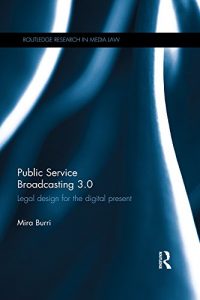The digital media environment is characterized by an abundance and diversity of content, a multiplicity of platforms, new modes of content production, distribution and access, and changed patterns of consumer and business behaviour. This has challenged the traditional model of public service broadcasting (PSB) in diverse ways.
This book explores whether and how PSB should adapt to reflect the conditions of the digital media space so that it can effectively and efficiently continue to serve its public mandate. Drawing on literature on media governance in media and communication science, public international law as well as discussions on cyberlaw, Mira Burri maps and critically analyses existing policy and scholarly debates on PSB transformation. She challenges some of conventional rationales for reform, identifies new ones, as well as exposes the limitations placed upon existing and future policy solutions by global media governance arrangements, especially in the fields of trade, copyright and Internet governance. The book goes on to advance a future-oriented model of Public Service Media, which is capable of matching an environment of technological and of governance complexity.
As a work that explores how public interest objectives can be pursued efficiently and sustainably in the digital media ecology, this book will be of great interest and use to students and researchers in media law, information technology law, and broadcast media studies, as well as to policy-makers.






